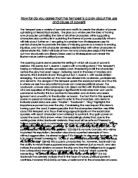'To what extent do you agree that the Masque is an "integral part of the action of the play" in The Tempest?
9th December
To what extent do you agree that the masque is “an integral part of the action of the play?”
The Tempest was first performed in 1611, at a time when the concept of the masque was becoming increasingly popular as a multimedia event. It represented a fairly elaborate form of courtly entertainment. The masque was usually performed by people of noble backgrounds and therefore when the performers revealed their true identities to their audience, themselves originally of noble background, the courtiers are meant to be seeing an exact reflection of their own personalities. The masque in the Tempest therefore offers itself as not only being crucial to the action of the play, but also as a symbolic tool of the current politics.
However, despite its other uses, on a basic level, and perhaps the only level to some of the least educated of the audience, the masque in the Tempest is an important element of the narrative and action of the play. The masque is instigated by Prospero to bless the marriage of Ferdinand to his daughter, Miranda. During the Stuart period, masques were often performed at weddings to honour marriages. Before the masque is created, Prospero informs Ferdinand that “as my gift, and thine own acquisition worthily purchased, take my daughter,” giving a clear indication that the performance of the masque which follows is a signal of Prospero’s eventual acceptance of the marriage of his daughter. Indeed, during the spectacle of the masque, Iris, the messenger to the gods, representing the rainbow, conveyed through the masque, responds to Ceres’, the goddess of the earth, also portrayed through the masque, that the reason for their summoning is “a contract of true love to celebrate.” This again emphasises that the masque is a celebration of betrothal. The masque is also essential to the action of the play as it serves as a reminder of the magic of the island. Prospero’s ability to conjure a masque reminds us of his arousal of a storm and provides a departure from some of the more ordinary events of the play; the attempts of Ariel and Caliban to reach freedom and Ferdinand’s labour to earn his marriage to Miranda.







